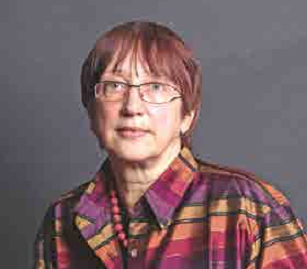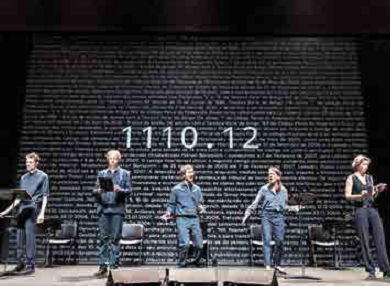Dr Milena Dragićević Šešić, Professor of Management in Culture and Mass Media Theory at the Faculty of Dramatic Arts in Belgrade and Head of UNESCO’s Cultural Policy and Management Department at the Belgrade University of the Arts
BITEF (The Belgrade International Theatre Festival) was created at a time when the culture of hope was nurtured, while today we are living in the culture of fear. The slogan of the jubilee 50th BITEF – “On the Back of a Raging Bull” – speaks about a world where there are no strong pillars of support and where the furious maelstrom of various types of fundamentalism is destroying everything in its wake. Theatre people are trying to maintain their balance on this “raging bull”, while creating their vision of the world.
BITEF celebrates its 50th anniversary this year. The festival was created in a political and geographical environment that was much different to today’s, and has managed to survive the changes that transpired in the meantime. That’s why we are asking Faculty of Dramatic Arts professor, Dr Milena Dragićević Šešić, whether it would be possible to create such a brave cultural experiment in the cultural ambiance that has virtually no cultural policy or culture as such?
She replies with a resolute “no”, because “BITEF, back in the day, was a radically different cultural experiment. Today one can put together a festival that would please the mainstream or a festival that is so commercially attractive that it has to make money, and that is incentive enough for some. To bring new, undiscovered theatre playwrights who are unconventional and who are not coming from the countries that are known for their theatre is as brave now as it was brave back then. Still, BITEF was created at the time when the culture of hope was nurtured, while today we are living in the culture of fear – as duly noted by French political scientist Dominique Moïsi. Hence, BITEF’s selectors are now developing a new concept that suits the spirit of this period of time.”
You are chairing the conference entitled “BITEF and Cultural Diplomacy: Theatre and Geopolitics”. How much did BITEF, or rather Mira Trailović and Jovan Ćirilov, contribute to the field that would be later called “cultural diplomacy”?
Their contribution was huge, despite our science and the theories of international relations and public diplomacy not even acknowledging cultural diplomacy as a soft skill that, in its international segment, helps countries to achieve much more. This is why the importance of BITEF hasn’t been researched to the fullest. This conference will try to shed light on this issue through several special sessions and lectures. Their first, and certainly biggest, contribution was putting Yugoslavia and Belgrade on the theatrical and cultural map of the world, almost at the very centre of it. Secondly, BITEF brings to this “world artistic map” artists and arts from the so-called Eastern Block, i.e. both dissident art and one which, due to its indirect opposition to the ruling regime, was unjustly marginalised or ignored by official global mainstream events. It also brings the tradition and Third World experimentations – from Nigeria to India – and everything else that theatre experts from renowned cultures chose to ignore or not mention in their analyses.
The official slogan of this year’s BITEF – “On the Back of a Raging Bull” – is a clear reminder of Europe and the turbulences that the continent has been experiencing. Do you see these events as the breakdown of the European concept and European values, as many political scientists and sociologists claim?
There have been many “civilisational breakdowns” or “ends of history” as we know it, but this title has a completely different meaning to me. It defines and redefines the world where there are no strong pillars of support and the furious maelstrom of various types of fundamentalism is destroying everything in its wake. Theatre people are trying to maintain their balance on this “raging bull”, while creating their vision of the world. By sharing their vision, they are setting up new frameworks for dialogue and meetings of cultures.
The themes of the 50th BITEF will cover the refugee crises, the closing of borders, erecting walls, European isolation, and the postcolonial attitude towards non-European cultures. How much do these things separate us from the valuable non-European cultural heritage?
Every time a wall is erected it is catastrophic primarily for those who erect these walls. By isolating itself, Europe missed out on an opportunity to achieve progress like the U.S. did. Today, the official American policy attracts thousands and thousands of people from all over the world to American universities – a concept which was practically copied from Europe (the so-called Humboldt University concept). The United States understood how important it was for the universities, i.e. for science and culture, to be open, and consequently it pressured Oxford and Cambridge into destroying their “walls” – namely, the Classic Greek Aptitude Test which was an enrolment prerequisite. This encouraged many American students, as well students from other countries, to enrol into what were then the world’s best scientific educational institutions.
Today’s “walls”, like the fencing off of Palestine, putting up barbed wire between Serbia and Hungary and across Istria, camps in Calais, refugee camps surrounded by high walls and camps where people have been living since 1948 (Sabra and Shatila in Lebanon, for example), are something that civilised people should be ashamed of. Hundreds of thousands of refugee children don’t go to school and are forced to work. Our peers – theatre workers from Lebanon and Palestine, like the Zoukak Theatre (which is opened thanks to the Tandem CEF Programme implemented together with the Cultural Decontamination Centre) and the Freedom Theatre – are doing an extremely important job. These issues will be addressed front and centre at our conference in the lecture given by Monika Mokre (from the Vienna-based Austrian Academy of Science), called “Cultural Diplomacy from Below: Artistic Projects with Refugees and Migrants”, and by Jonatan Stanczak from the Freedom Theatre.
Three years ago you wrote a book about India, Indian theatre, female leadership, entrepreneurship and innovative management in culture. As of September this year, it will be possible to learn Hindi in Novi Sad and Belgrade, and probably basic Sanskrit quite soon. How open is our society to new, faraway cultures?
I think there are quite a few people that have a keen interest in the world around us, although our situation doesn’t permit much travelling or having people from abroad come over. Still, it is worth noting that our university programmes and literature are open to various scientific discoveries.
In this great jubilee year, BITEF transcends the European framework which has been dominating the festival in the last few years, and is reverting to its original international character. We will be able to see plays from China, Singapore, Lebanon, African countries… What benefits will this U-turn bring?
It brings us back to BITEF’s original character as the meeting place for world theatre. The reason why BITEF was reduced to regional countries was mainly financial. In order to bring people from abroad, you need money. On the other hand, due to the sanctions from 1992, many global theatres, especially those from Europe, couldn’t participate in BITEF or didn’t want to. The 1990s were the time of political upheaval and of opening up, and during that period other world festivals started developing rapidly and assuming the role that BITEF had once played. These were the festivals like Homo Novus from Latvia and the Avignon Festival, which, through its Theorem Project, has been attracting many innovative theatres from Eastern Europe, and thus has practically taken over the uniqueness that BITEF demonstrated 30 years prior.
So, BITEF reopening itself to the global theatre scene means its return to its essence, while, culturologically speaking, it signifies a turning point in the Serbian culture that is now looking towards worldwide anti-globalist trends in art. These are the trends that require self-organising and a great level of self-awareness in marginalised players, to whom we belong, in running its own cultural policy and thus offering alternative platforms for the re-conceptualisation of contemporary world culture.

